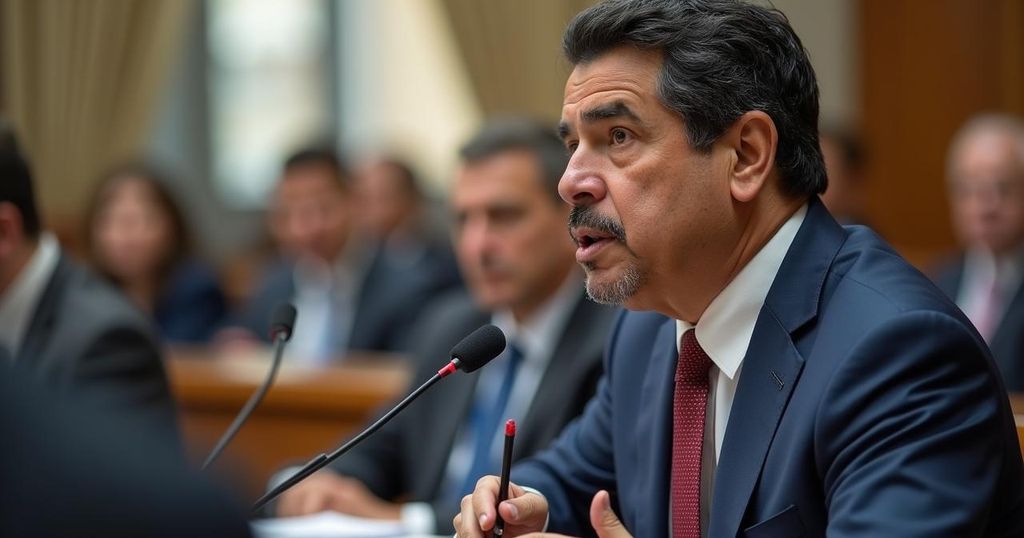Disappearance of Venezuelan Official Raises Questions About Electoral Integrity and Regime Stability

Elvis Amoroso, a close ally of Nicolás Maduro, has been missing for ten weeks after declaring Maduro the winner of the controversial July presidential election. His disappearance has sparked rumors of his arrest or detention by regime security forces. The opposition claims that the election results were fabricated, further questioning the legitimacy of the regime amidst an atmosphere of repression against dissenters.
Ten weeks ago, Elvis Amoroso, a prominent Venezuelan official and a close ally of Nicolás Maduro, publicly declared that Maduro had won the highly contested presidential election held on July 28. Since making this announcement, Mr. Amoroso has not made a public appearance, leading to rampant speculation regarding his whereabouts and safety. Various rumors have emerged on social media, suggesting possibilities of his arrest in Argentina, extradition to the United States, or detention by Venezuelan security forces as they suspect he might be planning to defect. This context raises concerns about the regime’s internal stability and the lengths it may go to suppress dissent and protect its leadership. Amoroso, appointed by Maduro to oversee the National Electoral Council, was tasked with ensuring that the election yielded a favorable outcome for the regime. However, following his last public appearance on August 5, where he purported to present documents affirming Maduro’s victory with nearly 52% of the votes, he has entirely disappeared from the public eye. The opposition, particularly Edmundo González’s supporters, assert that he won with over 68% and has received significant backing from the international community, which contests the official results announced by Mr. Amoroso. Furthermore, concerns have emerged that Amoroso’s absence aligns with a broader campaign of repression, wherein authorities have arrested approximately 2,000 dissenters who alleged electoral fraud. Rumors abound that Amoroso may be confined at Caracas’s military installation, Fuerte Tiuna, indicating that the regime might react preemptively to any potential dissent from within its ranks. Antonio De La Cruz, the president of Inter American Trends, articulated a compelling argument that the regime cannot afford for such a key figure to escape, highlighting the enmeshment of Amoroso’s statements in sustaining Maduro’s perceived legitimacy. Political science expert, José Vicente Carrasquero, cautioned that Amoroso’s re-emergence could reveal the regime’s duplicity, leading to severe repercussions for Maduro’s grip on power. Notably, Amoroso has not been seen participating in public or televised events since the election, further fuelling public curiosity regarding his fate. Additionally, while some early theories posited that Mr. Amoroso was facing extradition to the United States, these were dismissed by fact-checkers within the country, though speculation regarding his confinement persists. Ivan Simonovis, a former intelligence officer, added that even if Amoroso is permitted to move within Venezuela, it would likely be under meticulous surveillance, underscoring a broader atmosphere of fear and control within the Venezuelan regime. The mystery surrounding Elvis Amoroso’s disappearance reflects deeper issues within the Venezuelan government, highlighting the precarious nature of power amid allegations of electoral fraud and brutal repression of dissent. This precarious situation illustrates the potential for significant upheaval if key figures within the regime were to defect or divulge compromising information publicly. The international community continues to observe these developments closely, awaiting more definitive insights into the true state of affairs in Venezuela.
Elvis Amoroso’s disappearance follows his declaration of Nicolás Maduro’s electoral victory amidst widely contested election results. This event has intensified scrutiny of the Venezuelan regime, culminating in increased speculation about internal dynamics and security measures taken by the government to prevent dissent and maintain control. The situation is compounded by reports of widespread repression against political opponents and an environment of fear among those close to the regime.
In summation, the absence of Elvis Amoroso raises critical questions about the Venezuelan political landscape, shedding light on the regime’s repressive tactics to preserve its power. As the international community scrutinizes this matter, the implications of any potential revelations from figures like Amoroso could significantly challenge Maduro’s tenuous hold on authority in Venezuela.
Original Source: www.miamiherald.com







